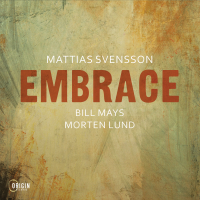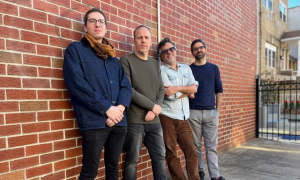Home » Jazz Articles » Inside the Songs » Gustavo Cortiñas Inspires Unity and Empathy Through Music
Gustavo Cortiñas Inspires Unity and Empathy Through Music

Courtesy Bruce Robeyk
The violin and sax duel freely and perhaps violently over the metric cocktail built by guitar and drums.
—Gustavo Cortiñas
And on that note, we come to the project of Chicago-based drummer and composer Gustavo Cortiñas, The Crisis Knows No Borders (Desafío Candente Records, 2025). Cortinas presents a compelling musical narrative that examines sustainability and global interconnectedness, featuring an exceptional ensemble that includes guitarist Dave Miller, tenor saxophonist Jon Irabagon and violinist Mark Feldman. Inspired by the far-reaching socio-political and humanitarian implications of climate change, The Crisis Knows No Borders explores the questions posed by global warming.
The music is profound and invigorating, conceptual in its presentation similar to Cortinas' 2021 album, Desafío Candente (Desafío Candente Records). Inspired by Eduardo Galeano's The Open Veins of Latin America (Monthly Review Press, 1971), it offers a deep reflection on heritage, folklore and colonialism. In 2022, Kind Regards, also on Desafío Candente Records, explored the immigrant experience in the United States. "My hope is to inspire unity and empathy through music, reminding us of our shared humanity and intertwined destinies," Cortiñas declared.
Born and raised in Mexico, son to a Uruguayan university professor and a Mexican elementary school educator, Cortiñas grew up surrounded by books of all kinds, ranging from religion and philosophy, to history, economics and art. Music was just as diverse: be it through the voice of Chavela Vargas, Wagner's operas, the revolutionary cry of Rock en Español, or the soothing songs of Edith Piaf, music of all kinds was always there.
As an accomplished artist, Cortiñas blends classical music, rock, jazz, and world influences into an inspiring creation that commands both respect and an intimate, thoughtful listening experience. The music on The Crisis Has No Borders as well as his other works emphasizes there is no time for nostalgia or its evil sister, complacency. It is at times awkward and at others beautiful, which is the nature of free jazz as the drummer explains of the song, "The Growth Imperative," which displaces and disrupts, ultimately the instruments humming along like an epileptic bumblebee.
What do we want? What is the thing we are after? As it was phrased in the reimagined song, "Skepticism," there lies a search for certain truths in the jungles of social media, the masquerades of the legacy news outlets and the hypocrisy of evasive political verbiage. Once in a while through all of this, all of the distinct layers of strata, there flashes some clairvoyance, some clear idea of a direction that feels right and one can glimpse in many of Cortiñas' compositions. The resonance of his works transcends the boundaries of jazz and stands as a statement of art in addressing the urgent crises of modern times, serving as a reminder that, even amidst uncertainty, music possesses the ability to unite and transform.
In Reginald Holmes' philosophical and nature-focused poem, "The Magic of Sound," he writes: "The earth has music for those who listen." Like music and art, love of nature is a common language that can transcend political or social boundaries. Cortiñas intends that upon reflection to the music from his ensemble we will be more capable of hearing the music of this planet and advocating for its environmental harmony. What follows are the contemplations of the composer for each of the pieces that comprise The Crisis Has No Borders. Continue on as Gustavo Cortiñas brings us inside the songs.
Inside the Songs of The Crisis Has No Borders
The Basic Economic Farsity
Scarcity, the fundamental economic principle, underpins our economic systems. This piece reflects on how it creates societal tension by prioritizing the luxurious wants of a few over the essential needs of many. Through motifs and textures, it explores the interplay between different groups—rural and urban, developed and developing, nature and technology—and the resulting harm to our world. It begins with a violin solo that melts into a folky motif over which the band starts to rumble and build a groove. It all builds to a cathartic melodic peak that cascades into a violent collective improvisation, which crescendos again to the original melody at the end.The Growth Imperative
Today's economic models demand perpetual growth, which is unsustainable for our finite planet. This piece vividly illustrates this concept with an expansive motif, seemingly unable to find a place to fit as it displaces itself around and disrupts everything, ultimately erupting into the unpredictability of free improvisation. The piece knows no strict metric or harmonic boundaries and always looks for the next corner.Oil and Water Don't Mix
Our economy and society are heavily reliant on fossil fuels, yet our existence hinges on vital natural resources like water. This piece delves into contrasting liquid textures, rubato melodic counterpoints, and the interplay of dry and wet sounds to depict the conflict between these essential needs. It highlights how our short-term economic desires often overshadow sustainability, leading us to compromise our future by depleting water and resources in pursuit of economic growth. A repeating counterpoint melody between the violin and sax carry this piece while the guitar and drums create improvisational textural landscapes behind it.Skepticism
A reimagined song now resonates in a fresh context, delving into existentialist themes of truth and skepticism, and the quest for personal truth. This exploration is juxtaposed with the logarithmic sensationalism of news and social media, where profitable lies masquerade as truths, breeding a perilous skepticism towards science. We rely on science and its discoveries to navigate forward. Yet, the propagation of falsehoods driven by profit margins and trends has led us to overlook the urgent need for attention and action towards this crisis. The slow building of motifs at the beginning that evade rhythmic boundaries and lead to chaos attempt to depict this fragile reality and framework, as well as our need to build anew, when all other notions are challenged and/or seem destroyed.Wishcycle
Recycled boxes and plastics from Amazon packages craft a percussive texture, serving as a commentary on the flawed recycling industry. Amid skepticism surrounding the crisis, we've resorted to creating illusions of "wishcycling" to alleviate guilt over our irresponsible consumer habits. Meanwhile, our industry persists in unsustainable practices driven by profit and convenience, further exacerbating the issue. Pizzicato textures from guitar and violin build on this structure while the saxophone builds a textural exploration atop.Sea Levels Rising
A fluid melody ebbs into a turbulent bridge, symbolizing the inevitable consequences of our societal and economic decisions: global warming, rising sea levels, and climate disasters leading to humanitarian crises. As Bo Burnham aptly put it, "the world is at your fingertips, the ocean at your door." An AABA tune that is also played with liquid textures and dynamic flows as we passage through the band members' individual solos.The Crisis Knows No Borders
For decades, developed countries fostered the illusion of detachment from the repercussions of their irresponsible industrial, social, and economic behaviors through globalization. However, the current crisis transcends borders, serving as a stark reminder of the interconnectedness and fragility of our world. The juxtaposition of an unusual metric cocktail with a rubato folkloric melody rolling over a shifting rhythmic base seeks to depict this interdependence and emphasizes that the only viable path forward is collective action. The violin and sax duel freely and perhaps violently over the metric cocktail built by guitar and drums.Your Right Under the Sun
"The system has not anticipated this minor inconvenience: what we have in surplus is people. And people reproduce. They make love with enthusiasm and without precautions. There are increasingly more people left by the wayside, without work in the countryside, where large estates reign with their vast wastelands, and without work in the city, where machines reign: the system vomits men... Latino children continue to be born, claiming their natural right to find a place under the sun in these splendid lands that could provide to all what they deny to almost everyone." (Eduardo Galeano) A punk/rock song that ensures rebellion and an unapologetic call for all to find their birthright under the sun.The Man of Flesh and Bone
A reimagined song now emerges with renewed relevance. Inspired by the introspective musings of Miguel de Unamuno on mortality, this piece seeks to depict the delicate nature of human existence, urging us to embrace one another with open hearts and minds. Yet, this compassion often eludes us as we reduce our fellow human beings to faceless statistics, disregarding the intricate interconnectedness of our destinies and our shared responsibility for each other's well-being. A simple yet beautiful saxophone intro leads to the melody that smoothly leads this ballad into a guitar feature by Dave miller.A drum solo for the end of times
A drum solo meditation on these trying times.Tags
Inside the Songs
Gustavo Cortiñas
dean nardi
Lydia Liebman Promotions
Dave Miller
Jon Irabagon
Mark Feldman
Chavela Vargas
Edith Piaf
PREVIOUS / NEXT
Support All About Jazz
 All About Jazz has been a pillar of jazz since 1995, championing it as an art form and, more importantly, supporting the musicians who make it. Our enduring commitment has made "AAJ" one of the most culturally important websites of its kind, read by hundreds of thousands of fans, musicians and industry figures every month.
All About Jazz has been a pillar of jazz since 1995, championing it as an art form and, more importantly, supporting the musicians who make it. Our enduring commitment has made "AAJ" one of the most culturally important websites of its kind, read by hundreds of thousands of fans, musicians and industry figures every month.

























